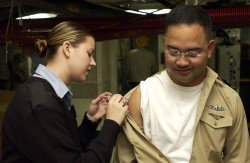Public health officials reported late last week that there have been 37 confirmed influenza-associated deaths in Georgia this flu season. That figure easily surpasses last season’s total of 10.
Metro Atlanta has seen 673 hospitalizations this flu season, the Georgia Department of Public Health said in its Weekly Influenza Report.
Yet there are also signs that the flu activity is declining in Georgia and other Southern states.
Last year, the predominant influenza strain was H3N2, known as Influenza A. This year, however, the H1N1 strain is making a comeback.
“Not even halfway through this season, we can already see that we have more severe cases than last year,” said Audrey Martyn, influenza surveillance coordinator at the Georgia Department of Public Health.
“It may be related to the fact that we are seeing H1N1 strain as the predominant strain not only in Georgia, but across the U.S. as well.”
More than 80 percent of the Georgia deaths have occurred in people ages 18 to 64.
The CDC reports that influenza activity in the United States remains high overall, with 41 states reporting widespread influenza activity. The designation has to
do with the geographical distribution of influenza-like illness in the area. “Widespread” is the highest classification on the CDC’s scale.
The Georgia Hospital Association is closely monitoring the flu levels across the state, said Kevin Bloye, a GHA vice president.
“While Georgia hospitals are seeing an increase in the number of flu cases, the volume of cases, at this point, has not been the biggest problem,” Bloye said. “The chief concern, right now, is the severity of the flu cases. Without question, patients who are coming to hospitals with the flu are much sicker than normal.”
While all age groups across the U.S. have been affected by the seasonal flu, young to middle-aged adults aged appear to be the hardest-hit group.
Patricia Cary, who directs the emergency department at Mount Sinai Roosevelt Hospital in New York, told USA Today that she’s been surprised “that we are seeing the occasional patient who is desperately ill with the flu — in particular, young adults.”
This year’s predominant flu strain “is similar to a flu strain from the 1950s and 1960s. So older adults have probably ‘seen’ it before and developed antibodies,” Cary said.
People in their 20s and 30s, especially if they haven’t been vaccinated, are sometimes having “serious respiratory illness because the strain is new to them,” she told USA Today.
Emory University held an additional flu vaccine day on Jan. 24, to give unvaccinated students, staffers and faculty members the opportunity to get a flu shot.
Dr. Michael Huey, director of Emory Student Health Services, encouraged students to be vaccinated as soon as possible.
“We have begun to see increasing numbers of influenza cases in our Emory students,” Huey wrote in a email to the Emory community on Jan. 21. “This year’s nationally circulating influenza strain appears to once again be differentially targeting young adults.”
Huey said the flu vaccine becomes maximally effective two weeks after it is administered.
As for the rest of the season, it’s too early to tell what’s in store, according to Martyn.
“I tend to think we should wait until the end of the flu season to categorize it,” she said. “We’ve seen deadly seasons in the past, but it’s too early to say that this is the deadliest season. We need time to see that.”
Martyn said there is evidence that flu activity has started to decline.
The CDC recently downgraded Georgia’s flu activity classification from widespread to regional, which is the second-highest level. Neighboring states South Carolina, Florida, Alabama and Mississippi are also reporting regional flu activity.
Still, citizens are being urged to get flu shots, which protect against H1N1 viruses.
“It’s never too late to get your flu vaccine,” Martyn said. “It’s absolutely the best way to prevent influenza.”
Natalie Duggan, a GHN intern, is a senior at Emory University, majoring in journalism and anthropology, specializing in health writing. She has previously interned at the CDC, the CNN Medical Unit, and was a summer 2013 ORISE research fellow at the National Institute of Allergy & Infectious Diseases.

